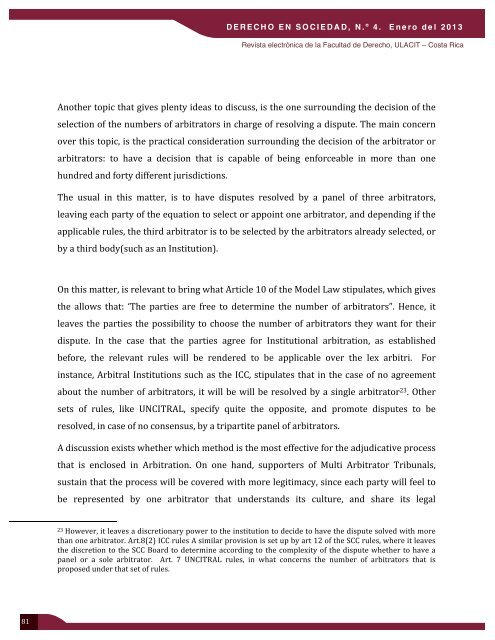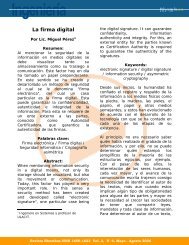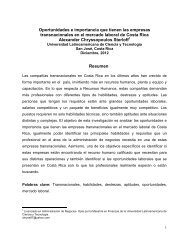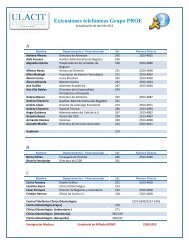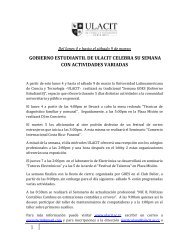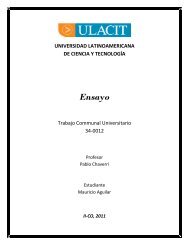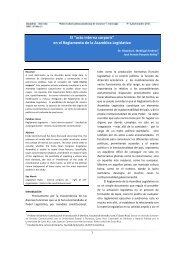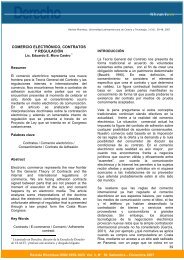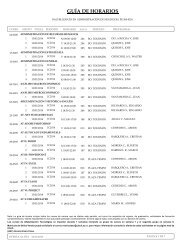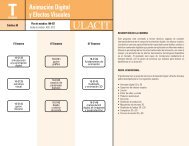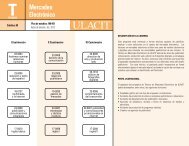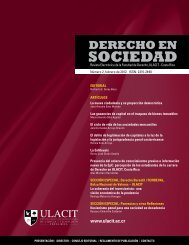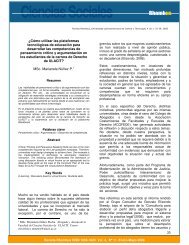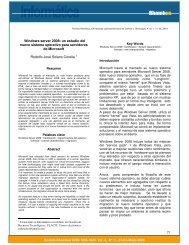IV Edición Revista Derecho en Sociedad - Ulacit
IV Edición Revista Derecho en Sociedad - Ulacit
IV Edición Revista Derecho en Sociedad - Ulacit
Create successful ePaper yourself
Turn your PDF publications into a flip-book with our unique Google optimized e-Paper software.
DERECHO EN SOCIEDAD, N. º 4 . Enero del 2013<br />
<strong>Revista</strong> electrónica de la Facultad de <strong>Derecho</strong>, ULACIT – Costa Rica<br />
Another topic that gives pl<strong>en</strong>ty ideas to discuss, is the one surrounding the decision of the <br />
selection of the numbers of arbitrators in charge of resolving a dispute. The main concern <br />
over this topic, is the practical consideration surrounding the decision of the arbitrator or <br />
arbitrators: to have a decision that is capable of being <strong>en</strong>forceable in more than one <br />
hundred and forty differ<strong>en</strong>t jurisdictions. <br />
The usual in this matter, is to have disputes resolved by a panel of three arbitrators, <br />
leaving each party of the equation to select or appoint one arbitrator, and dep<strong>en</strong>ding if the <br />
applicable rules, the third arbitrator is to be selected by the arbitrators already selected, or <br />
by a third body(such as an Institution). <br />
On this matter, is relevant to bring what Article 10 of the Model Law stipulates, which gives <br />
the allows that: ‘The parties are free to determine the number of arbitrators”. H<strong>en</strong>ce, it <br />
leaves the parties the possibility to choose the number of arbitrators they want for their <br />
dispute. In the case that the parties agree for Institutional arbitration, as established <br />
before, the relevant rules will be r<strong>en</strong>dered to be applicable over the lex arbitri. For <br />
instance, Arbitral Institutions such as the ICC, stipulates that in the case of no agreem<strong>en</strong>t <br />
about the number of arbitrators, it will be will be resolved by a single arbitrator 23 . Other <br />
sets of rules, like UNCITRAL, specify quite the opposite, and promote disputes to be <br />
resolved, in case of no cons<strong>en</strong>sus, by a tripartite panel of arbitrators. <br />
A discussion exists whether which method is the most effective for the adjudicative process <br />
that is <strong>en</strong>closed in Arbitration. On one hand, supporters of Multi Arbitrator Tribunals, <br />
sustain that the process will be covered with more legitimacy, since each party will feel to <br />
be repres<strong>en</strong>ted by one arbitrator that understands its culture, and share its legal <br />
23 However, it leaves a discretionary power to the institution to decide to have the dispute solved with more <br />
than one arbitrator. Art.8(2) ICC rules A similar provision is set up by art 12 of the SCC rules, where it leaves <br />
the discretion to the SCC Board to determine according to the complexity of the dispute whether to have a <br />
panel or a sole arbitrator. Art. 7 UNCITRAL rules, in what concerns the number of arbitrators that is <br />
proposed under that set of rules. <br />
81


